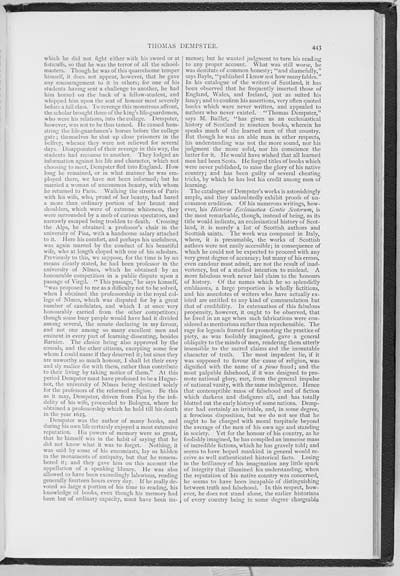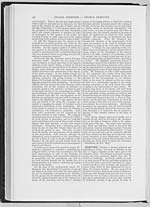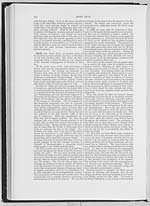443
which he did not fight either with his sword or at
fisticuffs, so that he was the terror of all the school-
masters. Though he was of this quarrelsome temper
himself, it does not appear, however, that he gave
any encouragement to it in others; for one of his
students having sent a challenge to another, he had
him horsed on the back of a fellow-student, and
whipped him upon the seat of honour most severely
before a full class. To revenge this monstrous affront,
the scholar brought three of the king's life-guardsmen,
who were his relations, into the college. Dempster,
however, was not to be thus tamed. He caused ham-
string the life-guardsmen's horses before the college
gate; themselves he shut up close prisoners in the
belfrey, whence they were not relieved for several
days. Disappointed of their revenge in this way, the
students had recourse to another. They lodged an
information against his life and character, which not
choosing to meet, Dempster fled into England. How
long he remained, or in what manner he was em-
ployed there, we have not been informed; but he
married a woman of uncommon beauty, with whom
he returned to Paris. Walking the streets of Paris
with his wife, who, proud of her beauty, had bared
a more than. ordinary portion of her breast and
shoulders, which were of extreme whiteness, they
were surrounded by a mob of curious spectators, and
narrowly escaped being trodden to death. Crossing
the Alps, he obtained a professor's chair in the
university of Pisa, with a handsome salary attached
to it. Here his comfort, and perhaps his usefulness,
was again marred by the conduct of his beautiful
wife, who at length eloped with one of his scholars.
Previously to this, we suppose, for the time is by no
means clearly stated, he had been professor in the
university of N�mes, which he obtained by an
honourable competition in a public dispute upon a
passage of Virgil. " This passage," he says himself,
"was proposed to me as a difficulty not to be solved,
when I obtained the professorship in the royal col-
lege of N�mes, which was disputed for by a great
number of candidates, and which I at once very
honourably carried from the other competitors;
though some busy people would have had it divided
among several, the senate declaring in my favour,
and not one among so many excellent men and
eminent in every part of learning dissenting, besides
Barnier. The choice being also approved by the
consuls, and the other citizens, excepting some few
whom I could name if they deserved it; but since they
are unworthy so much honour, I shall let their envy
and sly malice die with them, rather than contribute
to their living by taking notice of them." At this
period Dempster must have professed to be a Hugue-
not, the university of N�mes being destined solely
for the professors of the reformed religion. Be this
as it may, Dempster, driven from Pisa by the infi-
delity of his wife, proceeded to Bologna, where he
obtained a professorship which he held till his death
in the year 1625.
Dempster was the author of many books, and
during his own life certainly enjoyed a most extensive
reputation. His powers of memory were so great,
that he himself was in the habit of saying that he
did not know what it was to forget. Nothing, it
was said by some of his encomiasts, lay so hidden
in the monuments of antiquity, but that he remem-
bered it; and they gave him on this account the
appellation of a speaking library. He was also
allowed to have been exceedingly laborious, reading
generally fourteen hours every day. If he really de-
voted so large a portion of his time to reading, his
knowledge of books, even though his memory had
been but of ordinary capacity, must have been im-
mense; but he wanted judgment to turn his reading
to any proper account. What was still worse, he
was destitute of common honesty; "and shamefully,"
says Bayle, "published I know not how many fables."
In his catalogue of the writers of Scotland, it has
been observed that he frequently inserted those of
England, Wales, and Ireland, just as suited his
fancy; and to confirm his assertions, very often quoted
books which were never written, and appealed to
authors who never existed. "Thomas Dempster,"
says M. Baillet, "has given us an ecclesiastical
history of Scotland in nineteen books, wherein he
speaks much of the learned men of that country.
But though he was an able man in other respects,
his understanding was not the more sound, nor his
judgment the more solid, nor his conscience the
better for it. He would have wished that all learned
men had been Scots. He forged titles of books which
were never published, to raise the glory of his native
country; and has been guilty of several cheating
tricks, by which he has lost his credit among men of
learning.
The catalogue of Dempster's works is astonishingly
ample, and they undoubtedly exhibit proofs of un-
common erudition. Of his numerous writings, how-
ever, his Historia Ecclesiastica Gentis Scotorum, is
the most remarkable, though, instead of being, as its
title would indicate, an ecclesiastical history of Scot-
land, it is merely a list of Scottish authors and
Scottish saints. The work was composed in Italy,
where, it is presumable, the works of Scottish
authors were not easily accessible; in consequence of
which he could not be expected to proceed with any
very great degree of accuracy; but many of his errors,
even candour must admit, are not the result of inad-
vertency, but of a studied intention to mislead. A
more fabulous work never laid claim to the honours
of history. Of the names which he so splendidly
emblazons, a large proportion is wholly fictitious,
and his anecdotes of writers who have actually ex-
isted are entitled to any kind of commendation but
that of credibility. In extenuation of this fabulous
propensity, however, it ought to be observed, that
he lived in an age when such fabrications were con-
sidered as meritorious rather than reprehensible. The
rage for legends framed for promoting the practice of
piety, as was foolishly imagined, gave a general
obliquity to the minds of men, rendering them utterly
insensible to the sacred claims and the immutable
character of truth. The most impudent lie, if it
was supposed to favour the cause of religion, was
dignified with the name of a pious fraud; and the
most palpable falsehood, if it was designed to pro-
mote national glory, met, from the general impulse
of national vanity, with the same indulgence. Hence
that contemptible mass of falsehood and of fiction
which darkens and disfigures all, and has totally
blotted out the early history of some nations. Demp-
ster had certainly an irritable, and, in some degree,
a ferocious disposition, but we do not see that he
ought to be charged with moral turpitude beyond
the average of the men of his own age and standing
in society. Yet for the honour of his country, as he
foolishly imagined, he has compiled an immense mass
of incredible fictions, which he has gravely told; and
seems to have hoped mankind in general would re-
ceive as well authenticated historical facts. Losing
in the brilliancy of his imagination any little spark
of integrity that illumined his understanding, when
the reputation of his native country was concerned,
he seems to have been incapable of distinguishing
between truth and falsehood. In this respect, how-
ever, he does not stand alone, the earlier historians
of every country being in some degree chargeable

![]() Universal Viewer |
Universal Viewer | ![]() Mirador |
Large image | Transcription
Mirador |
Large image | Transcription
![]()

